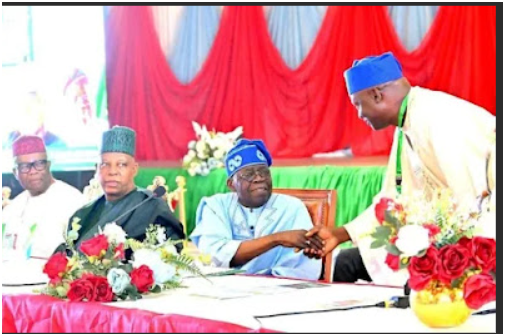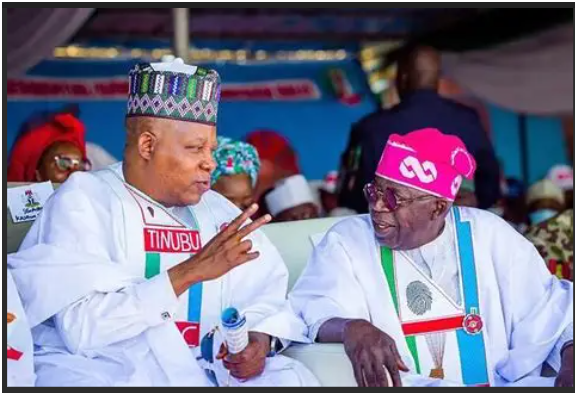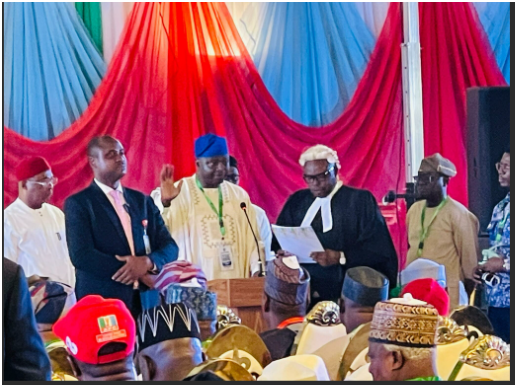Technocrat’s elevation neutralizes North-East tension, tilts ruling party dynamics toward Middle Belt strategy
Byline: Political Desk
The All Progressives Congress (APC) has entered a new political phase following the emergence of Prof. Nentawe Yilwatda as National Chairman — a surprise appointment that analysts believe could significantly reshape the party’s succession calculus ahead of 2027, particularly regarding Vice President Kashim Shettima’s presidential viability.
Yilwatda’s confirmation at the party’s 14th National Executive Committee (NEC) meeting comes amidst an increasingly tense internal power chessboard within the ruling party, where ethnic balance, religious sentiment, and future ticket permutations are all under strategic recalibration.
“This is not a routine change — it’s a deliberate power reset to avoid regional redundancy and religious discontent,” a senior APC source told IDNN. “Yilwatda’s appointment indirectly fortifies Shettima’s relevance in 2027.”
🔻 From North-East squeeze to zoning equilibrium

Before his emergence, there was growing discomfort in APC circles over the dual occupation of the party’s highest seats by North-East politicians — Shettima as VP and Ali Dalori as Acting Chairman. This overlap threatened to weaken the VP’s leverage within the party.
Yilwatda’s rise — a Christian from Plateau State in the North-Central zone — instantly deescalates that zoning imbalance, restoring geopolitical symmetry and easing anxieties among Shettima loyalists.
“By moving the chairmanship back to the Middle Belt, APC kills two birds: it cools North-East congestion and rebuilds trust with alienated Christian blocs,” said political analyst Ikechukwu Onuoha.
Christian identity and digital credibility: Yilwatda’s dual advantage
Yilwatda’s appointment brings more than ethnic and religious recalibration. As a professor of engineering, former INEC commissioner, and digital governance expert, he offers the APC a technocratic facelift amid rising demand for competency-driven politics.
A respected figure among Christian communities in the Middle Belt, Yilwatda is also the son of a reverend and was instrumental in driving ICT reform during his tenure at the Federal University of Agriculture, Makurdi. His blend of faith-based outreach and tech-savvy governance may help APC rebrand itself in regions hurt by the Muslim-Muslim 2023 ticket.
“We needed this kind of moral-political balance,” said a Plateau APC chieftain. “He’s not just a party guy — he’s a symbol of what we’ve lacked.”
Shettima’s path: clearer, but not guaranteed

As one of the coordinators of the Tinubu/Shettima 2023 campaign, Yilwatda’s ties to the Vice President are strong. His new role at the party’s helm is being seen as a subtle endorsement of Shettima’s future — whether as returning VP or a frontline presidential aspirant should President Tinubu step aside.
“It’s chess, not checkers,” an APC strategist confided. “Nentawe could be Shettima’s internal anchor come 2026.”
However, shadows of another potential contender loom. Rumors continue to swirl that National Security Adviser Nuhu Ribadu, also from the North-East, is being positioned by powerful Aso Rock insiders as a possible VP replacement or even a 2027 dark horse.
So far, Ribadu has remained silent — a posture that insiders see as strategic.
Governors, youth blocs endorse bold move

08112935565, 08161558757
Governor Hope Uzodimma reportedly moved the motion to zone the chairmanship back to the North-Central and nominated Yilwatda, describing him as a “bridge between Nigeria’s past and its digital future.”
Former Minister Adebayo Shittu and North-Central chieftain Dominic Alancha both praised Yilwatda’s emergence as a generational shift. Alancha added:
“We’re demystifying this idea that you must be a former governor to chair a party. Let young blood flow.”
Critics who argue that Yilwatda lacks political grit are reminded that he contested the Plateau governorship in 2023 and graciously accepted the Supreme Court’s ruling — a rare show of political maturity in Nigeria’s heated electoral arena.
🔻 One party, multiple calculations

While the APC celebrates “renewed harmony,” the emergence of Yilwatda is, at its core, a sophisticated power repositioning. Regional balance, religious inclusion, youth optics, and internal loyalty are all being recalibrated under a new banner — one that may shield the party from future fragmentation.
“Nentawe’s appointment is a consolidation move. It’s not just about today. It’s about who controls the engine room before the next war begins,” said APC insider Kabir Abubakar.
This is IDNN. Independent. Digital. Uncompromising
